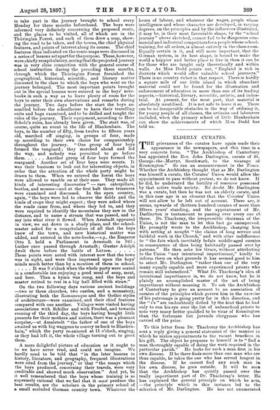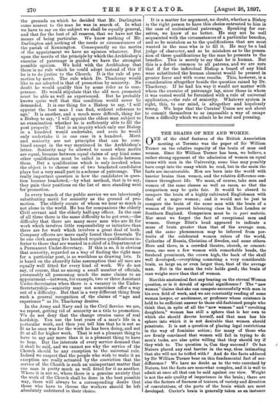ELDERLY CURATES.
T"grievances of the curates have again made their appearance in the newspapers, and this time in a very concrete form. "The Archbishop of Canterbury has appointed the Rev. John Darlington, curate of St. George-the-Martyr, Southwark, to the vicarage of Kennington." So ran an announcement in the Times. Whether the Archbishop thought that as Mr. Darlington. was himself a curate, the Curates' Union would allow the appointment to pass without protest, we do not know. If he did, he underrated the fertility of resource possessed by that active trade society. No doubt Mr. Darlington' was a curate, but then he was not an elderly curate, and in this case age is an element that the Curates' Union will not allow to be left out of account. There are, it seems, upwards of thirteen hundred curates of more than fifteen years' standing, and the appointment of Mr. Darlinrton is tantamount to passing over every one of., these. Dr. Thackeray, the irrepressible chairman of the Union, is not the man to let this fact go unimproved. He promptly wrote to the Archbishop, charging him with setting at nought "the claims of long service and faithful work in the Church," and with utter indifference to "the fate which inevitably befals middle-aged curates in consequence of thus being habitually passed over by patrons." He then asks his Grace, without attributing to the Union "any intentional impertinence," kindly to inform them on what grounds it has seemed good to him to select Mr. Darlington "rather than one of the very many equally capable and more experienced priests who remain still unbeneficed." What Dr. Thackeray's idea of intentional impertinence is, we do not know, but he is plainly an accomplished master of the art of being impertinent without meaning it. To ask the Archbishop of Canterbury to give an account to an association of curates of the principles which govern him in the exercise of his patronage is going pretty far in this direction, and the "i's " are undoubtedly dotted by the hint that he had only to run his eye over the list of unbeneficed priests to note very many better qualified to be vicar of Kennington than the fortunate but juvenile clergyman who has carried off the prize.
To this letter from Dr. Thackeray the Archbishop has sent a reply giving a general statement of the manner in which he makes appointments to the vacant benefices in his gift. The object he proposes to himself is to "find a man thoroughly capable of doing the work required in the particular parish." He looks for such a man first in his own diocese. If he there finds more than one man who are thus capable, he takes the one who has served longest in the diocese. If he cannot find any such man in his own diocese, he goes outside. It will be seem that the Archbishop has quietly passed over the really impertinent part of Dr. Thackeray's letter. He has explained the general principle on which he acts, —the principle which in this instance led to the selection of Mr. Darlington. He has not enumerated the grounds on which he decided that Mr. Darlington came nearest to the man he was in search of. In what we have to say on the subject we shall be equally general, and that for the best of all reasons, that we have not the means of being particular. We know nothing of Mr. Darlington and nothing of the needs or circumstances of the parish of Kennington. Consequently on the merits of the appointment we have no opinion whatever. But upon the merits of the principle by which the Archbishop's exercise of patronage is guided we have the strongest possible opinion. We hold with the Archbishop that there is no rule which he could adopt instead of this if he is to do justice to the Church. It is the rule of pro- motion by merit. The rule which Dr. Thackeray would like to see adopted is that of promotion by seniority. No doubt he would qualify this by some rider as to com- petence. He would stipulate that the old men promoted must be able as well as experienced. But he probably knows quite well that this condition would never be demanded. It is one thing for a Bishop to say, will appoint the best man I can find, without reference to age.' It is another, and a much more difficult, thing for a Bishop to say, ' I will appoint the oldest man subject to an examination whether he is sufficiently able to fill the post properly.' That is an inquiry which only one Bishop in a hundred would undertake, and even he would only undertake it in one case in a hundred. Merit and seniority are not principles that can be com- bined except in the way mentioned in the Archbishop's letter. Seniority may be allowed to count when merits are equal, because between equal claims of any kind some other qualification must be called in to decide between them. But a qualification which is only invoked when the object is to choose one of two bracketed candidates plays but a very small part in a scheme of patronage. The really important question is how the candidates in ques- tion become bracketed,—by what methed, that is to say, they gain their positions on the list of men standing next for promotion.
In every branch of the public service we are laboriously substituting merit for seniority as the ground of pro- motion. The elderly curate of whom we hear so much is not alone in the world. He has for companions the elderly Civil servant and. the elderly half-pay officer. In the case of all three there is the same difficulty to be got over,—the difficulty that there are many more men who are fit for work which involves little responsibility or initiative than there are for work which involves a great deal of both. Company officers are more easily found than Generals. To be one clerk among five hundred requires qualifications in- ferior to those that are wanted in a chief of a Department or a Permanent Under-Secretary. If this is so, it is obvious that seniority, regarded as a way of finding the right man for a particular post, is as worthless as drawing lots. It is based on the absurdly false assumption that all men are equally well fitted for every kind of work. We do not say, of course, that as among a small number of officials, presumably all possessing much the same claims to an appointment—between, for example, two or three Assistant Under-Secretaries when there is a vacancy in the Under- Secretaryship—seniority may not sometimes offer a way out of a difficulty. But that is a very different thing from such a general recognition of the claims of "age and experience" as Dr. Thackeray desires.
In the Army and Navy and in the Civil Service we are, s‘e repeat, getting rid of seniority as a title to promotion. We do not deny that the change creates cases of real hardship. You use the best years of a man's life in a particular work, and then you tell him that he is not so fit as he once was for the work he has been doing, and not fit at all for higher work. That is not a pleasant thing to have to say any more than it is a pleasant thing to have to hear. But the interests of every service demand that it shall be said, and we cannot see why the service of the Church should be any exception to the universal rule. Indeed we suspect that the people who wish to make it an exception are really actuated by the conviction that the service of the Church is such an unimportant matter that one man is pretty much as well fitted for it as another. Where it is not so, where there is a genuine anxiety that the work of the Church shall be done in the best possible way, there will always be a corresponding desire that those who have to choose the workers should be left absolutely unfettered in their choice. It is a matter for argument, no doubt, whether a Bishop is the right person to have this choice entrusted to him in the case of ecclesiastical patronage. Speaking for our- selves, we know of no better. He may not be well acquainted with the circumstances of a particular benefice, and so be mistaken as to the qualifications that are most wanted in the man who is to fill it. He may be a bad judge of character, and so be mistaken as to the posses- sion of these qualifications by the man he presents to the benefice. This is merely to say that he is human. But this is a defect common to all patrons, and we are sure that if for the individual Bishop a board of any kind were substituted the human element would be present in greater force and with worse results. This, however, is a consideration altogether beside the question raised by Dr. Thackeray. If he had his way it would not matter with whom the exercise of patronage lay, since those in whom it was vested would be furnished with a rule of universal application,—the rule of seniority. Whatever system is right, this, to our mind, is altogether and hopelessly wrong. We hope that the Curates' Union are not about to commit themselves to so impossible a way of escape from a difficulty which we admit to be real and pressing.



































 Previous page
Previous page